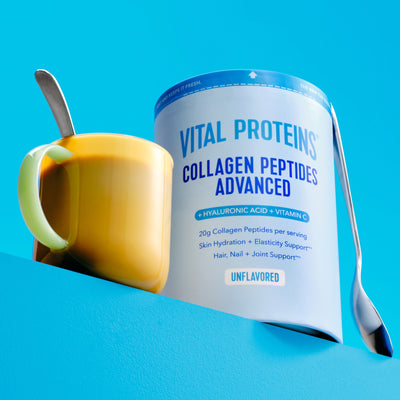When you hear the words "plump," "supple" and "firm," in relation to the skin, what people are actually talking about is skin elasticity. This is provided by a protein fiber in the skin called elastin.
"Elasticity is the ability of the skin to recoil back to its original shape when stretched," explains Dr. Harshal, MD, SCE UK, a practicing clinical and aesthetic dermatologist. It allows the skin to "bounce back" better after things such as weight loss or gain and pregnancy.
Like collagen, another protein fiber, it also plays a significant role in the aging process. But, similar to collagen again, elastin is broken down by the natural aging process. This can result in sagging, leathery skin and deep wrinkles.
Here, experts explain how you can get a firm hold on skin elasticity, including how to restore it.
can elastin be restored?
First, it's important to discuss what causes loss of skin elasticity, better known as elastosis. According to Malini Fowler MD, FAAD, board-certified dermatologist at Westlake Dermatology, elastin is broken down in many ways.
This includes the "natural aging process, sun exposure, air pollution, smoking and poor nutrition. We also see it in several genetic conditions."
So, what can you do about it? The good news is that elastin can be restored. But, according to Dr. Harshal, don't expect dramatic results. "It's more important to prevent rapid loss of elastin in the first place."

What causes skin elasticity?
According to Dr. Nathan Brown, Chief Science Officer at Parallel Heal, that spring in your skin is "maintained throughout our lives by elastin fibers in our dermis." This is the skin layer below our epidermis (what we see in the mirror) and above the subcutaneous layer (where we store fat).
Elastin isn't just skin related, either. It plays a role every time you bend and extend your joints, as it supports ligaments, says Dr. Fowler.
What is good skin elasticity?
Simply put, elastic skin is plump, supple and firm. A baby's skin is a perfect example of this, as it's got that "bounce" to it. When we experience elastin loss as we get older, Dr. Harshal says that this can result in sagging skin and deeper wrinkles: "The skin looks and feels wrinkly and leathery."
Loss of elasticity in the skin can also lead to problems like stretch marks. "Well-nourished and moisturized skin tends to be more elastic. This is because it holds onto water. Dry skin tends to be less elastic," adds Dr. Harshal.
You don't have to just read about skin elasticity. You can try it out for yourself! Simply use what some call the pinch test: "Good skin elasticity means that when we pinch or push our skin, it quickly bounces back to its original position," says Dr. Brown.
How can I increase collagen and elastin in my skin?
Collagen and elastin are very closely related. They are both protein fibers that give skin its structure. Collagen even promotes elastin in the skin, leaving it firm and supple.
Learn how to increase these two protein fibers with these expert-recommended tips.

Eat a healthy diet
What you eat can have a direct impact on your skin. This is why you want to give your body the nutrients your skin cells need to produce collagen and elastin. According to Dr. Brown, the skin-loving foods to include in your diet include red and yellow vegetables, berries, green tea and even garlic.
"Eating a diet high in omega fatty acids and vitamins A, B, C and E can also help increase collagen production," adds Dr. Fowler.
As for what to avoid, you (and your skin) skin are bound to crash following a sugar rush. "Excess sugar (or foods with a high glycemic index) in the diet binds to collagen and elastin in the skin, making it more rigid," explains Dr. Harshal. "As it becomes less flexible, it causes the skin to become more inelastic."
Use a retinoid
Regular use of retinoids reigns supreme when it comes to anti-aging. That’s because it helps prevent fine lines and wrinkles before they happen by "boosting production of collagen and therefore improving skin elasticity," says Dr. Fowler.
Another standout ingredient is hyaluronic acid. "Topical hyaluronic acid binds to water in the skin, making it plump and hydrated," adds Dr. Harshal. "This helps maintain some elasticity."
Take a collagen supplement
"Collagen supplements have recently been shown to promote elastin and collagen production in the skin," Dr. Harshal tells Lively. This is where Vital Proteins®' line of collagen products comes in.
Everything from Original Collagen Peptides to Vital Proteins Beauty Collagen® will help provide that youthful appearance. Matcha Collagen is another delicious option that comes with 10g of collagen, therefore promoting skin elasticity.**
Avoid sun damage
"The more sun damage, the less elastic tissue in the skin, which causes looseness, sagging and wrinkling of the skin," explains Dr. Lily Talakoub, board-certified dermatologist and Co-Founder of Derm to Door.
To help protect the skin from ultraviolet radiation (both UVA and UVB rays), Dr. Brown says to wear broad-spectrum sunscreen: "If you prevent rapid elastin breakdown, then your skin cells will replace your elastin naturally."
Don't smoke
It's an understatement to say that smoking is bad for your skin. Studies show: "smoking causes a breakdown of collagen and elastin, making the skin sag and lose its plumpness," says Dr. Harshal. But that's not the only thing you should worry about getting into your lungs.
Dr. Harshal says that free radicals, such as air pollution, have similar effects: "Pollutants can cause a breakdown in the skin's natural support structures.” Protect your skin with antioxidants, such as vitamin C.
Chemical treatments
It’s hard to resist the allure of cosmetic procedures when you want fast results. Chemical peels, for example, "can jumpstart the production of both in the skin," says Dr. Fowler. Another option is platelet rich plasma or PRP injections. When used in combination with microneedling, this can "increase elasticity as well as collagen production."
Any procedure that causes resurfacing of the skin can also help, adds Dr. Talakoub.
"Collagen and elastin can be restored with stimulating lasers which either heat (radio frequency) or break down (fractionated resurfacing) the collagen and elastin in the skin, which promotes the cells to rebuild new collagen and elastin."

can elasticity be restored?
Yes – but to a certain extent. "It takes about 3-6 months to see changes, which will be subtle at first," Dr. Harshal tells Lively. "Slowly, over a period of one year, more obvious changes will be seen."
More than anything, the experts echo prevention: "Skin elasticity can be restored, but because it's complex for our skin cells to produce elastin fiber," says Dr. Brown. In this way, he says that it’s often best to support your body as it naturally maintains skin elasticity.
Again, the answer to "how can I increase collagen and elastin in my skin?" lies in things such as eating well, not smoking, taking collagen supplements and proper sun protection. This is in addition to exercising and getting enough beauty sleep.
















